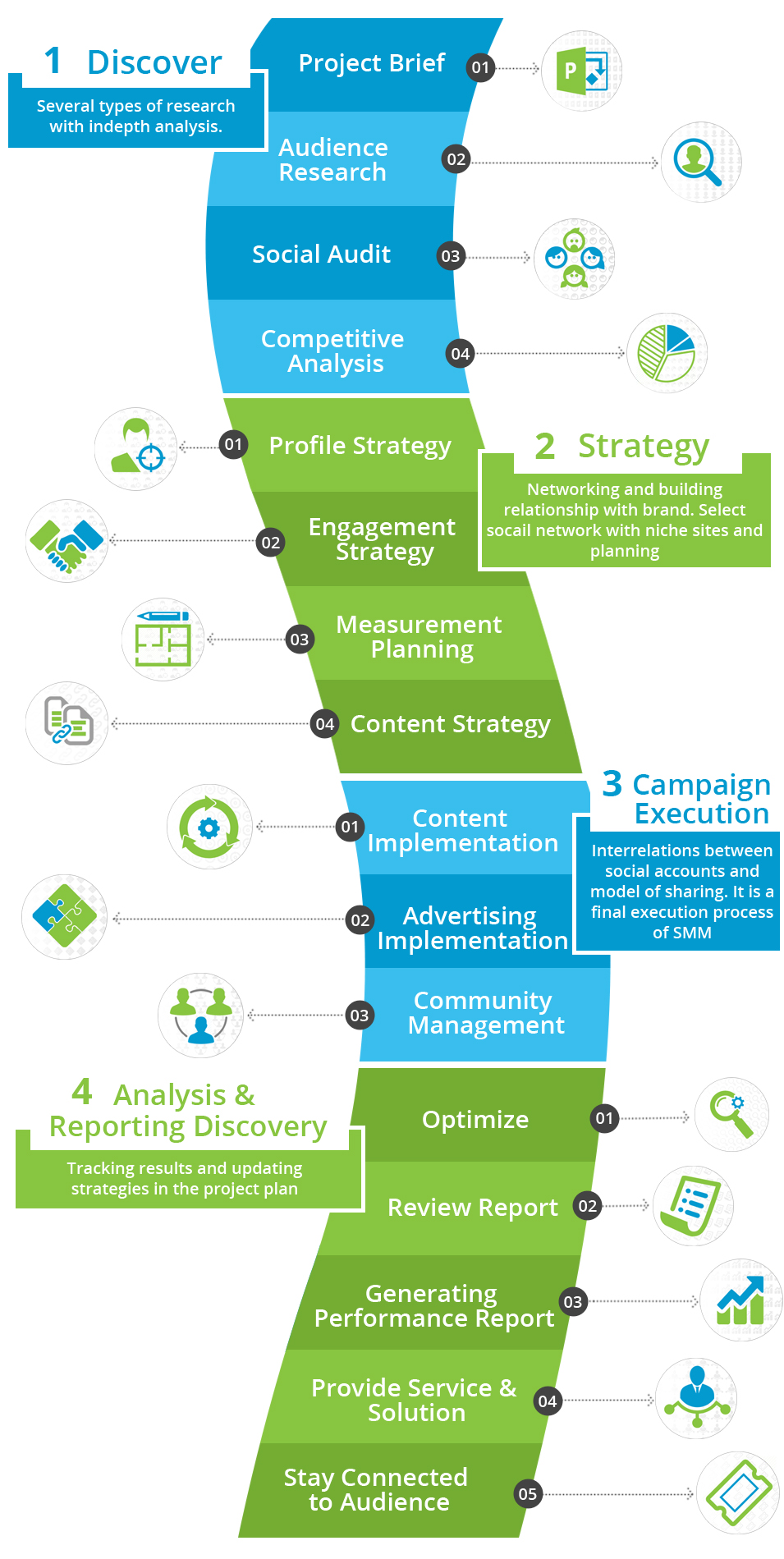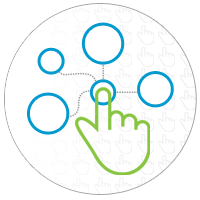- Target the most useful influencers in your niche.
- Increase the number of word-of-mouth recommendations
- Closely monitor conversations regarding your company and industry.
Social Media Process
We believe that with strict guidelines, organized process and a well-defined strategy in our social media marketing, we can experience the most success on social. We do not start with pure tactics, rather we back them up with research and data.
4 Ways to Master Social Media Marketing

Phase 1: Discovery
This is the core of your social strategy. Each step builds up after a rigorous research on your business, digital landscape, competitors and social media presence, which will be utilized during the other phases of the project.

Project Brief
Define important client information, including business goals and other necessary information for creating proper documentation which will be useful in the other stages of the project.

Audience Research
Utilize ad tools for identifying audience sizes according to keywords, influencers and interests.

Social Audit
Dig into analytics data to create a strong foundation for your current social media performance.

Competitive Analysis
Use industry keyword search as a basis to determine the top competitors of the business in social media, and know the platforms the competitors are using. We may also need to do client interviews and other means of probing.
Phase 2: Strategy
Design a complete Social Media Marketing strategy and project plan which states deliverable and measurable business goals clearly.

Profile Strategy
Establish an actionable plan for developing or optimizing profiles in different networks.

Engagement Strategy
Create a guide on how to engage with users in and out of the social community of the client. Design a plan that reaches out to influencers in order to take advantage of their networks for the distribution of content.

Measurement Planning
Create quantifiable short and long term goals for evaluating campaign performance.

Content Strategy
Generate a content calendar which features content that will be posted according to social media network and profile.

Advertising Strategy (optional)
Design an advertising plan and budget for the most beneficial networks. The goals of each part of the plan should be defined, whether it is community engagement, community growth, conversions or anything else.
Phase 3: Campaign Execution
Implement recommendations based on the Profile Strategy & Content Strategy phases with the goal of reaching campaign objectives.

Content Implementation
Follow content strategy and social media marketing best practices when distributing content to the proper networks.

Advertising Implementation
Strictly follow the advertising strategy in implementing advertising campaigns. If needed, adjustments can be made to the strategy.

Community Management
Interact with influencers and users in different networks while keeping in line with the engagement strategy.
Phase 4: Analysis & Reporting Discovery
Perform regular reporting, which includes campaign performance analysis, goal tracking and KPIs and use the results for making adjustments to the project plan.

Monthly Performance Report
Create an extensive report of the current standing of campaign metrics, goals and tasks completed, then plan for the next month.

Quarterly Review
Complete overview of the campaign, including the adjustments made to the project plan.

We Harness the Power of Social Media to Increase User Engagement and Generate Sales
Leverage social media as tools for increasing brand awareness and improving website visibility on search engine giants like Google. It can also be used to enhance your brand, generate traffic into your site and increase sales.

Tapping into Meaningful Conversations with Customers
Conversations build customer relationships. Social media platforms have become a great tool for businesses to build social media trust through meaningful conversations. Knowing where your audience interact and going there can leverage your online presence. Investigate the topics that matter to your audience and talk to them with a genuine interest. It is vital to hear what they are saying to determine their interests, dislikes, issues and the like.

Provide Immediate Customer Service
Social media gives companies the invaluable opportunity to promptly handle issues with customer service. It can be proactive, through close monitoring of what people feel or say about your company. It can also be directly, by offering communication channels for feedback, suggestions and any other concerns.

Engage Visitors by Encouraging Them Contribute Content
An effective way of engaging the public is by encouraging them to contribute content. Statistics show that social media audiences love to enter competitions hosted by their favourite brands. You can run competitions, use polls to give your social reach a voice, ask interesting questions. Doing it correctly can effectively engage customers and “browsers” while improving brand awareness and helping increase sales.

Give Exclusive Discounts and Offers to Your Audience
Online shopping is about finding the best deals and discounts. Social media is an excellent opportunity for giving exclusive discounts and offers to your loyal customers. With every offering, you can captivate a huge chunk of your fan base while measuring the campaign’s success through social media analytics monitoring.

Humanize Your Corporate Image
Big corporations come across as too technical, intimidating or detached to the public. Social media can give a personal touch that humanizes your brand. It helps rip down the wall that separates it from its audience. This makes the company more easily reached by public, including customers and potential customers.
Social Media Integration
Social Media Marketing is an excellent opportunity for brands to target the right audience. There are several tactics that can be utilized to get noticed by your target audience:
- Share content easily using Facebook, Twitter and many other 2.0 websites
- Easily create accounts and logins using Facebook Open Graph
- Use effective social media tools for instantly creating bookmarks to your website
- Integrate Facebook on eCommerce sites to take advantage of the influential capabilities of social media
Channels for Social Media Integration
- Facebook Connect / Open Graph
- Google Connect
- Twitter Connect
- OpenID
- Facebook Friend Connect
- Google Friend Connect
- Twitter Status RSS Feeds
- Google Profile
- Facebook Profile Badge
Examples of Social Media Integration

Common Social Media Marketing Mistakes
People are now connected to each other more than ever through social media platforms, participating in conversations regarding your company and industry. This makes social media quite overwhelming, but as long as you stay clear of these common mistakes, you will be able to enjoy the fruits of effective social media marketing:

1. Ignoring It All Together
Social networking and blogging are among the most popular activities online. In fact, 67% of global users regularly visit member communities and 10% of total time spent online is on social media sites. People are likely talking about your brand on social media which is invaluable to your company if you’re willing to listen to what they are saying.

2. Assuming Social Media is Cheap and Fast
Businesses want everything and they want it fast. However, social media requires patience and finding the right timing. You can’t expect to join a social network and derive value from it in just a few days. It takes a lot of work to connect with the right people and build your social media presence.

3. Assuming That Anyone is Capable of Maintaining A Social Media Campaign
It is not just about the availability of technology and some knowledge but you also need an effective strategy and experience. It may take some trial and error to find the right approach to your social media campaign. It is about choosing your priorities according to what is most beneficial to your company whether it is Facebook, Twitter, a blog or YouTube. The focus should be adding value to customers where they can be found digitally.

